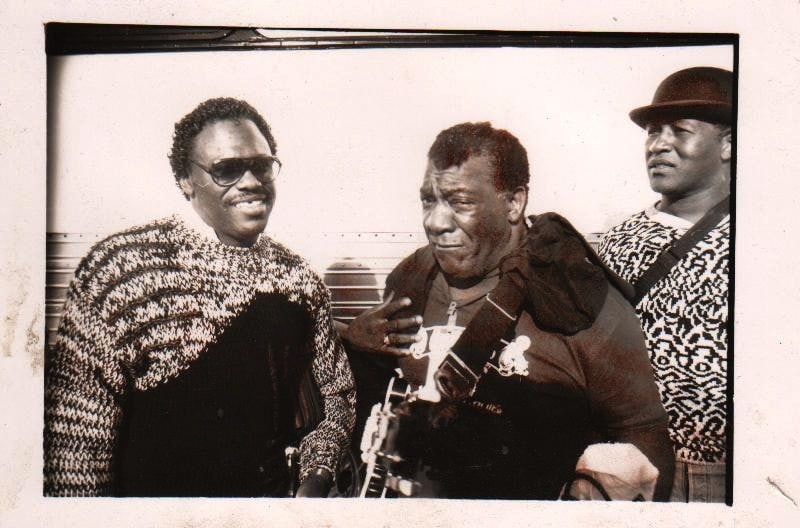

Joe Louis Walker, Wayne Bennett and Henry Oden
A person could go on and on in that vein and be totally valid. However, let me make it more personal and touch on those questions, and delve a bit deeper.
I was born into the Blues to a mother and father who were from the Deep South. America at that time was legally segregated, and in the South it was dangerous for folks like my mom and dad. So that right there gave me an introduction to the blues, literally, coming out of the womb.
America at that time was legally segregated, and in the South it was dangerous for folks like my mom and dad
I know most of the old Blues masters had to deal with the Blues every day of their lives. The indignities were a big part of what the Blues was born out of. For me the Blues isn’t notes, loud guitar solos, records sold or tour buses. To me the Blues is a means of survival in a hostile environment.

Joe Louis and Ike Turner
But one finds it difficult to get out of the environment, complain about the environment, or change the environment. So most of the older guys I knew and played for: Mississippi Fred McDowell, Earl Hooker, John Lee Hooker, Muddy Waters, B.B. King, Jimmy Rodgers, Freddie King, Albert King, Ike Turner, Buddy Guy, T-Bone Walker and many more departed from the South. They took their music with them to all kinds of places where they didn’t have the oppressive situation that the Deep South always held over them.
One finds it difficult to get out of the environment, complain about the environment, or change the environment
I was spared growing up in that environment, but my mom and dad instilled the love of the music in me, by playing the records and telling me who the titans of the genre were. Due to that I had an around-the-clock education about the men, and women, who invented what is now known as the Blues. But as far as I’m concerned it’s the story behind the people that played the music which is what always intrigued me.

Joe with Willie Dixon

Joe together with the great Hubert Sumlin
Some were rough, some were scholars, some were poets and some were virtuosos. But they all had the same experience with finding their voice to declare: ‘I’m a man‘, which they couldn’t say in any other way but through their music (or they could suffer dire consequences). However, there was one thread that ran through the men and women who invented, promoted and performed the Blues… they all Lived the Blues. Not vicariously, but in their day-to-day lives. And for the most part it wasn’t pleasant.
They all had the same experience with finding their voice to declare: ‘I’m a man‘
In any discussion about the Blues it’s necessary to paint a complete picture of the circumstances it was born out of. Not only the upside of success but the downside of the reality of what really could, and did, happen to the Blues stars of the past. I guess we could take the case of Bessie Smith, cited by Janis Joplin as one of her main influences in life (Bessie and Janis were in a male dominated business and both were bi sexual), as well as music. Bessie Smith was one of the most well known and successful pre-war Blues artists in the history of Blues. She had million-selling singles (this was before albums) on the Columbia labels Race Records category. These records were sold primarily to African-Americans. Blues was performed, promoted and sold to mainly black peoples at that time.

Joe Louis and Albert King
Bessie was known as the Empress of the Blues. The story of her death is the story of the Blues. She was touring the Deep South in her beautiful touring vehicle when they had a horrible car accident. Bessie was taken to the nearest hospital. Once at the hospital, bleeding and in dire need of medical attention, she was denied admission because of the color of her skin. And the long ride to the colored hospital was one of the main reason she died. At the time she was in successful movies and selling out concerts. But she wasn’t allowed to go to a certain hospital. That is the REAL Blues.
Bessie Smith lived, and died, the Blues.
It’s ironic that Janis Joplin died from an overdose. I’m sure the medical people did everything in their power to save her life. Bessie was doomed the day she was born because of where and when she was born. It’s to her credit that she defied all the odds and became as successful as she did at that time. But all the success, money and notoriety couldn’t save her from the situations that were systemic in the South at that time. Those conditions were what brought on the Blues, pure and simple.

On stage with the inimitable Ike Turner

James Cotton, Joe and Charlie Haden
Don’t get me wrong, I think it’s wonderful that Janis Joplin loved Bessie Smith and wanted to, and did, emulate Bessie. My point is Janis wanted to sing/play the Blues, whereas Bessie Smith lived and died The Blues. You can feel the highs and lows of life when Bessie sang because she sang of her true experiences. And you can say the same for Muddy Waters, B.B. King, Sonny Boy Williamson II and many more.
Bessie Smith lived and died The Blues
Let’s take another instance of living the Blues: Sonny Boy Williamson II. There’s an incident of him and Levon & The Hawks (who later became The Band), going to eat after a gig in Arkansas. The Band ordered food and were waited on, Sonny Boy was not waited on or served. The story goes that Levon and the band exited the place with Sonny Boy. Though Sonny Boy was said to be a bit demoralized, he dealt with it mainly through his music – The Blues. And that also sounds like the Levon Helm that I knew. In my eyes and heart that’s the Blues and the conditions it came from. It’s the Blues of yesterday and today. Maybe not so much being denied access to a lunch counter today, but the degradation that Sonny Boy endured. Some of those situations are in effect today.

Joe Louis holding his daughter Bernice with B.B. King

Joe and Johnny Winters

Joe, Dr. Hohn and Albert Collins
Let’s move on to another example of Living The Blues. The constant harassment of Billie Holiday, known as Lady Day. Billie was constantly harassed by the law for being addicted, but they also took her all-important Cabaret Card. The card allowed you work in New York at decent venues, radio broadcasts, good paying high society parties and recording opportunities. Without the card she was forced to take sub-par gigs and tours. Basically keeping her down in life as well as business. It all hit the bottom when Billie was arrested by enthusiastic undercover police officers in San Francisco for drugs. They knew she was a celebrity and an easy mark. So they made an example of her and the cops wanted to further their careers. They also wanted to drive home the point that Blues and Jazz was performed by lawless, dangerous, uneducated, degenerate individuals and that the music had no value.
It all hit the bottom when Billie was arrested by enthusiastic undercover police officers in San Francisco for drugs
That train of thought was very prevalent in some places. But not in my house or my friends’ houses. We looked at these situations as we did when Chuck Berry was charged with the Mann Act (only used against Chuck and Jack Johnson!) or when Miles Davis was assaulted by the police, or when Thelonious Monk had his Cabaret Card taken away. These were all instances of Blues and Jazz artists being leaned on by the powers that be, because the music was a threat to the norms of the times. All these instances that I’ve laid out are but a few that define what the Blues is to me.

Joe and Robert Cray
You’ll notice I didn’t mention gold records, sold out tours, merchandise, and Blues Cruises. Or any other rewards that are connected with having a successful career playing Blues nowadays. The reason being the Blues has very rarely paid off for those that, against all odds, brought it to the world. But it did, and is, paying off for those who’ve tapped in to the power, credibility, and longevity of the Blues. Many rock bands that release a Blues record get a new shot in the record sales, Billboard charting and newfound credibility. By simply playing old war horses, blues standards and dedications to Blues Masters who are no longer here.
The reason being the Blues has very rarely paid off for those that, against all odds, brought it to the world
You wonder why that is. It’s because Blues never goes out of style. You don’t need smoke machines, dancing girls, or a huge recording budget. The Blues means credibility by it’s survival nature. Just mention the names: B.B. King, Howlin’ Wolf, Muddy Waters, John Lee Hooker, Buddy Guy, just to name a few, and it’ll open up conversations that will invariably have folks talking of their first encounters with the Blues.
Personally the Blues is my heritage and my mother tongue. I love to hear it, I love to see it, and I love to play it! It’s taken me to places that I could only dream of. It’s given me comfort when I’ve been down, and joy when I’ve needed it.
I’ll leave with a quote I hear and see quite a bit nowadays. It says we should always ‘Keep the Blues alive‘.
I feel the Blues is keeping us alive. It has me.




